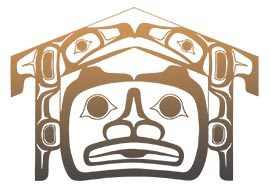What about X̱wi7x̱wa is special?
- X̱wi7x̱wa Library is the only Indigenous branch of an academic library in Canada
- it is often looked to as a leader in Indigenous Academic Librarianship in British Columbia, Canada and internationally
- its staff, services, and collections are key drivers that support the UBC Indigenous Strategic plan and Indigenous initiatives in UBC Library’s strategic plan
X̱wi7x̱wa is known for: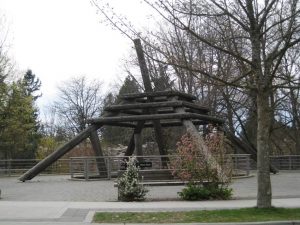
- a unique Indigenous classification system and subject headings (see Indigenous Knowledge Organization)
- librarians and staff who are knowledgeable about Indigenous content
- one-of-a-kind collections that privilege Indigenous perspectives
- a unique architecture that represents an Interior Salish pit-house
First Nations House of Learning Bibliography:
- First Nations House of Learning Bibliography
- for more information on the history of X̱wi7x̱wa
- for publications from our Librarians
- for those doing research on Indigenous Librarianship
UBC Indigenous Honorary Degree Recipients:
The First Nations House of Learning released an online book in tribute to Indigenous individuals who have received an honorary degree from UBC. Read The Honour of One is the Honour of All and more about the creation of the book here.
Online PDF of branch brochure.
Timeline
-
2024
Kayla Lar-Son becomes Acting Head.
-
May 25, 2023
First Nations House of Learning celebrates 30th anniversary of the official opening of the Library and Longhouse building.
-
June 1, 2020
Kayla Lar-Son joins X̱wi7x̱wa Library as Indigenous Programs and Services Librarian. Check out this podcast interview Kayla did in July 2020 with Donna Langille, Community Engagement Librarian and UBC Innovation Library, Okanagan campus:
-
May 1, 2020
Karleen Delaurier-Lyle becomes X̱wi7x̱wa Library’s permanent Information Services Librarian.
-
September, 1 2019
Sarah Dupont is appointed head of X̱wi7x̱wa Library.
-
2019-2020
X̱wi7x̱wa Library appears in several online feature articles from Pique Newsmagazine, YES! Magazine and Library Journal.
-
2018
Founding librarian Gene Joseph is awarded an honorary Doctor of Laws degree from Vancouver Island University. Joseph had worked as a librarian for the historic Delgamuukw court case.
-
2015 December
X̱wi7x̱wa librarians Ann Doyle, Kim Lawson and Sarah Dupont co-author “Indigenization of Knowledge Organization at the X̱wi7x̱wa Library” in the Journal of Library and Information Studies.
-
2014 January
Aboriginal Engagement Librarian position created as a permanent position (1/2 time X̱wi7x̱wa Library; 1/2 time Irving K. Barber Learning Centre)
-
2013 April
X̱wi7x̱wa Library and First Nations House of Learning 20th Anniversary celebration. The Library’s windows were decorated and ribboned with the names of almost 800 people who have supported the Library.
-
2011 September
New Aboriginal Engagement Librarian – one year term position created, and hired.
-
2008 March
New Technical Services and Cataloguing Assistant position created, and hired.
-
2007 September
Building renovation completed to create 2 new office spaces.
-
2006 November
New Reference Librarian position created, and hired.
-
2005
X̱wi7x̱wa Library becomes a branch of the University of British Columbia Library.
-
2004-2005
“Gene Joseph and Ann Doyle apply to the Library of Congress MARC Standards Office to have X̱wi7x̱wa Library subject headings recognized as an internationally authorized thesaurus. The application was accepted in 2005 and the newly named First Nations House of Learning (FNHL) Subject Headings were established as an Indigenous thesaurus, which could then be fully indexed in the authorized subject headings MARC field (650) with full subfield coding, thus enabling both browseable indexes and faceted searching by subtopic.”
Reference: Doyle, A. M., Lawson, K., & Dupont, S. (2015). Indigenization of knowledge organization at the X̱wi7x̱wa library. Journal of Library and Information Studies, 13(2), pp. 113
-
1998
Gene Joseph First Nations Scholarship created at the UBC School of Library, Archival and Information Studies through an endowment established by the British Columbia Library Association – First Nations Interest Group and the UBC First Nations House of Learning.
-
1996-1998
Gene Joseph and Ann Doyle lead students and staff in undertaking a huge project. Together they map “the X̱wi7x̱wa bibliographic database to MARC format, migrate the data to the UBC Library catalogue, and barcode the entire library collection so borrowers can browse online and materials can circulate to all borrowers with a UBC Library card.”
Reference: Doyle, A. M., Lawson, K., & Dupont, S. (2015). Indigenization of knowledge organization at the X̱wi7x̱wa library. Journal of Library and Information Studies, 13(2), pp. 112-113
-
1995
Head Librarian position created, and approved by University Senate. Gene Joseph, founding Head Librarian 1995-1997.
-
1993 May
NITEP donates its research collection to the newly established First Nations House of Learning Longhouse and X̱wi7x̱wa Library.
-
1993 May
The First Nations House of Learning Longhouse and Library facility opens. Chief Simon Baker names the Library, X̱wi7x̱wa, “echo” or “copy” in the Squamish language. William and June Bellman donate $1M to the library.
-
1984
Verna Kirkness, Director, First Nations House of Learning, wins a Stauffer Foundation Grant for Gene Joseph to build the collections.
-
1974
British Columbia Native Indian Teacher Association (BCNITA) and UBC Faculty of Education create the Native Indian Teacher Education Program (NITEP).
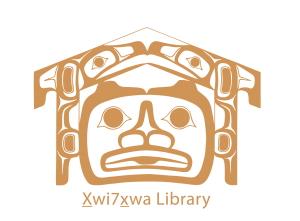 What is the story of the logo?
What is the story of the logo?
Tsimshian artist Glen Wood created the First Nations House of Learning logo. It consists of a human face surrounded by two ravens, which also form the frame of a longhouse. The face is a humanoid with frog-like features and represents First Nations people. The house design represents the university, or “House of Learning” which is the way some Aboriginal languages refer to schools. The Raven, a symbol of creativity and learning, is also known as a trickster or transformer in many First Nations cultures. As represented here, Raven is transforming the university to reflect First Nations cultures and philosophies, linking the university to First Nations communities.
For more information about our logo and our usage policy see here.
What does Xwi7xwa mean?
X̱wi7x̱wa means “echo” in Sḵwx̱wú7mesh Sníchim (Squamish language). To hear the pronunciation see here.
Chief Simon Baker of the Squamish Nation gave the name to the library at the First Nations House of Learning Opening Ceremonies on May 25, 1993. The mandate of the X̱wi7x̱wa Library is to “echo” the voices and philosophies of Indigenous people through its services, collections, and programs.
We wish to acknowledge the confusion that exists around the proper pronunciation of X̱wi7x̱wa. As a library that maintains a collection of Indigenous Knowledges and language resources we recognize the importance of our role in information sharing. We also understand the importance of language revitalization and our responsibility to make this correction out of respect to local nations.
To rectify this, our team (or a member of our team) met with both the Musqueam Language & Culture Department and the Squamish Language & Cultural Affairs Department to learn the correct pronunciation of X̱wi7x̱wa. Our teachers reminded us of the care we must take with Indigenous languages.
From Squamish, we thank Samaya Jardey and Norm Guerrero; from Musqueam, we thank Larry Grant, Vanessa Campbell, Jill Campbell, and Mack Paul for their time and patience as we learn together.
From The First Nations Longhouse: our home away from home:

Kirkness, V. J., & Archibald, J. (2001). The First Nations Longhouse: our home away from home. Vancouver: First Nations House of Learning.
“Chief Baker bestowed the Squamish name X̱wi7x̱wa, pronounced ‘whei wha,’ on William Bellman, who had donated $1 million to the project. Chief Baker explained: X̱wi7x̱wa means ‘echo’ in our language. When our people traveled in the early days, the echo served as a compass. When a person hollered, the ‘echo’ let you know how far you were from the beach. There is a story, which is very long, that has been handed down over the years about X̱wi7x̱wa. When you hear the story, you draw your own conclusions about its teaching. If you ever have lots of time, come over, and I’ll tell you the whole story. I believe the name X̱wi7x̱wa is the right name for you because of your early work in radio and television, which like the echo was a way to communicate. The library will carry your name and be known as X̱wi7x̱wa Library in your honour. I feel that the library is very important to the students who are studying here. It will be a place where they can read about what our people did in the past. I give you this paddle to help you in the future. Don’t leave home without it! My wife gives you this drum to remember this occasion.”
Find this book at X̱wi7x̱wa: GH K57 F57 2001
Buy this book at the UBC Bookstore.
To hear the pronunciation of Xwi7xwa see here.
Former Head Librarian of the Xwi7xwa Library (First Nations House of Learning Library) at the University of British Columbia, Gene Joseph is of Wet’suwet’en – Nadleh Whut’en descent. She is from the small village of Hagwilget in northern British Columbia. She has over three decades of experience in developing libraries for First Nations tribal councils, bands and organizations. One of Gene’s career highlights was the development of a legal research library for the Gitxsan and Wet’suwet’en First Nations in the Delgamuukw et al v. the Queen et al aboriginal title court case. It was one of the largest court cases held in Canada, as well as one of the first to extensively use computer systems in and out of the courtroom. More importantly to the First Nations people, there was extensive use of oral history in support of the case. Gene continued her commitment to aboriginal title through her work for the Haida aboriginal title case, working with the EAGLE (Environmental Aboriginal Guardianship through Law and Education) organization from 2002 to 2006. She continued her commitment to aboriginal title and rights through her work as a senior advisor and Director of Research and Litigation Support for White Raven Law from 2008 until her retirement in 2015.
The Gene Joseph Scholarship is awarded in her honour.
What is this structure called?
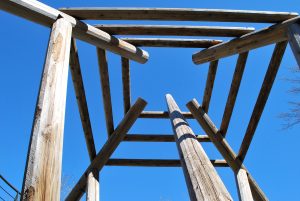
Our building is designed after structures built by Salish nations. In the Chinook Jargon language it is called a Kekuli, in English it is called a pit house, and in Ucwalmícwts (Lil’wat nation) it is called a S7ístken. Other nations that live in these homes are the Tsilhqot’in, Ktunaxa, Nlaka’pamux, and the Secwepemc.
Although our roof is exposed they are normally covered with bark, earth, grass, and needles. The hole at the centre allows smoke to escape from the fire inside. The central pole is used as a ladder to enter and exit but visitors are unable to use this feature with the absence of notches to ensure proper footing. Visitors must use our staircase and accessible ramp instead.
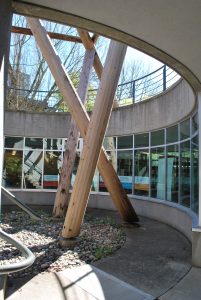
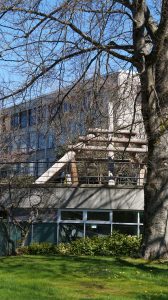

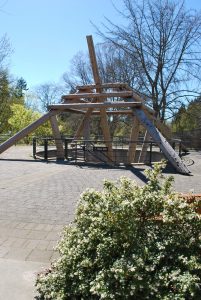
Our branch is 198 square metres and half subterranean. Within, patrons have access to our collections, archives, computers and other technology equipment, and a gender neutral washroom.
For more information on the design of X̱wi7x̱wa Library, see this blog post.
